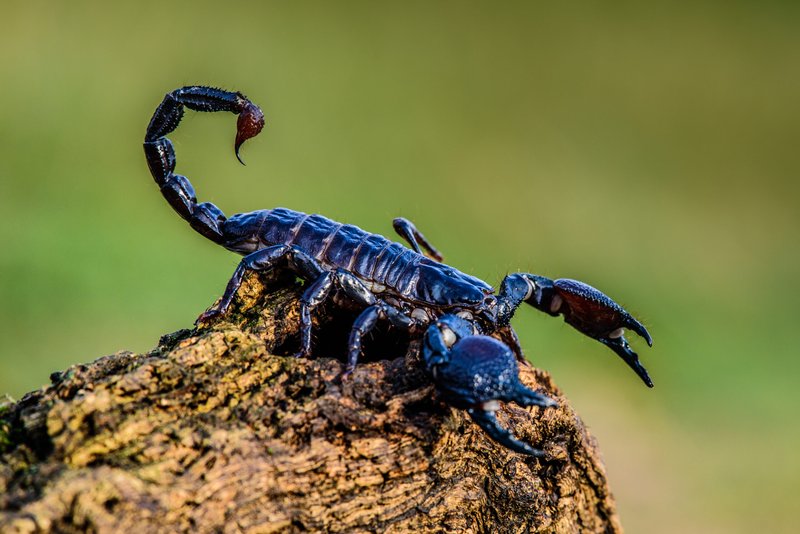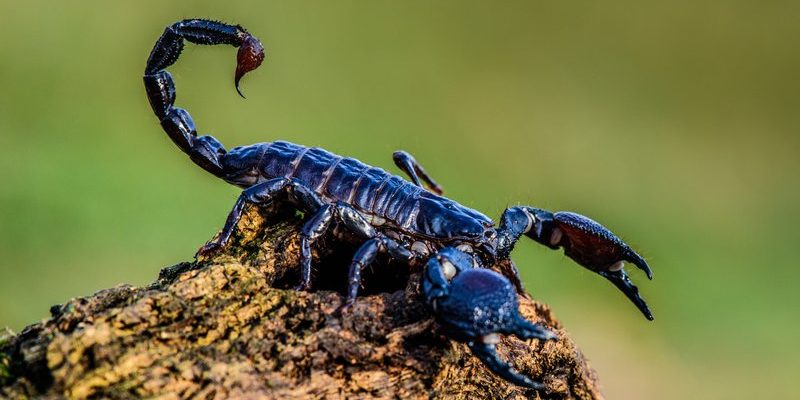
Let’s dive into the fascinating world of the Emperor Scorpion. These impressive creatures are found primarily in the rainforests and savannas of West Africa. Their presence might seem intimidating, but they hold an important function in maintaining ecological harmony. Much like how bees pollinate flowers and help plants reproduce, Emperor Scorpions serve their own unique purpose in nature.
So, why should you care? Understanding the role of the Emperor Scorpion can help us appreciate the intricate web of life that surrounds us. It not only gives us insight into the delicate balance of ecosystems, but it also highlights the importance of protecting these often-overlooked creatures.
Physical Characteristics of the Emperor Scorpion
The Emperor Scorpion is quite the specimen with its shiny, black exoskeleton and impressive size. Growing up to 8 inches long, they are one of the largest scorpion species. Their large pincers are not just for show; they are crucial for hunting and defense. Those pincers, or chelae, will often trap their prey before injecting venom, but don’t let that scare you. Their venom isn’t lethal to humans—just enough to subdue smaller animals.
But there’s more! The Emperor Scorpion also has a unique feature that many people find fascinating: they glow under ultraviolet light. This bioluminescence is still somewhat of a mystery, but scientists believe it helps them communicate or even protect themselves from predators. It can be quite a sight, making them a popular choice for exotic pet lovers.
When we look at their physical attributes, we can better appreciate how they interact with their environment. Their characteristics enable them to thrive in their habitats, becoming both predator and prey in the process.
Predator and Prey Dynamics
In the balanced ecosystem where Emperor Scorpions reside, they play a crucial role as predators. Their diet mainly consists of insects, spiders, and other small invertebrates. When you think of the food chain, they sit firmly on the middle rung, helping control the populations of these smaller creatures. This is key for maintaining a healthy ecosystem.
The prey, in turn, also has its place in this intricate system. By keeping insect populations in check, the Emperor Scorpion indirectly benefits plants and trees, as an overabundance of insects can lead to significant damage. Think about it: if insects run rampant, they could devour plant life, which could lead to habitat destruction for a whole host of animals, including the scorpions themselves.
It’s a classic example of how interconnected life is; a single species can have wide-reaching effects on its environment. As a predator, the Emperor Scorpion ensures that the ecosystem remains stable and healthy.
Role in Soil Health
You might not think of scorpions as *soil engineers*, but that’s exactly what they are! By hunting prey and breaking down organic matter, they contribute to soil health. As they consume insects, they help facilitate nutrient cycling in the soil by breaking down these organisms. This process benefits plant life, allowing for healthier, more robust growth.
Furthermore, their burrowing habits aerate the soil. Just like how turning over soil can help gardens flourish, their movements in the ground help improve the soil structure. When the soil is aerated, it allows for better water retention and root growth, creating a more fertile environment for plants to thrive.
So the next time you’re out in a green space, think about the tiny organisms like the Emperor Scorpion doing their part beneath the surface to promote healthy ecosystems.
Conservation and Environmental Impact
Now that we’ve established how essential the Emperor Scorpion is, it’s crucial to touch on the topic of conservation. Sadly, many species of scorpions face threats from habitat loss, pollution, and climate change. These factors can significantly disrupt their natural habitats, which in turn affects the entire ecosystem.
Conserving the environments where Emperor Scorpions thrive is vital. When their habitats are protected, we safeguard a host of other species as well. This includes not only the scorpions themselves but also their prey and the plants they depend upon for shelter and food.
Moreover, understanding their role in the ecosystem can help raise awareness about the need to protect these creatures. Organizations and individuals can work together to promote habitat conservation initiatives, ensuring that these scorpions continue to play their part in nature.
Emperor Scorpions and Human Interaction
Interestingly, Emperor Scorpions are also gaining popularity as exotic pets. Their striking appearance and mostly docile nature make them appealing to many. However, owning one comes with responsibilities. It’s crucial to ensure that they are not taken from the wild, as this can further endanger their populations.
Moreover, educating pet owners about their care can help ensure these critters live happy, healthy lives in captivity, thereby reducing the impact of the pet trade on wild populations. The more we understand these fascinating creatures, the better we can care for them—whether in the wild or as part of our homes.
You might be wondering how you can help in this endeavor. Supporting sustainable practices and educating others about the importance of ecosystems can go a long way. By advocating for the conservation of such species, we can ensure their role in the ecosystem continues for generations to come.
The Big Picture: Ecosystem Interconnectedness
At the end of the day, the role of the Emperor Scorpion in nature and ecosystems is more significant than it might seem at first. They’re part of a delicate balance, working alongside countless other species to maintain health and stability.
When we look at ecosystems as interconnected networks, it becomes clear that every species has its part to play. The Emperor Scorpion, with its remarkable characteristics, hunting skills, and contribution to soil health, exemplifies just how critical even the tiniest creatures are in sustaining the whole.
Being aware of their role encourages us to appreciate not only the Emperor Scorpion but also the entire network of life around us. Protecting biodiversity means protecting ourselves, too. By understanding and respecting these relationships, we can contribute to a healthier planet.
In conclusion, the Emperor Scorpion may be a small player in the grand scheme of things, but its contributions to nature are vast and invaluable. So next time you think of scorpions, remember they are more than just creepy crawlies—they’re essential parts of a vibrant ecosystem. Let’s honor their role and help preserve the beauty of nature!

